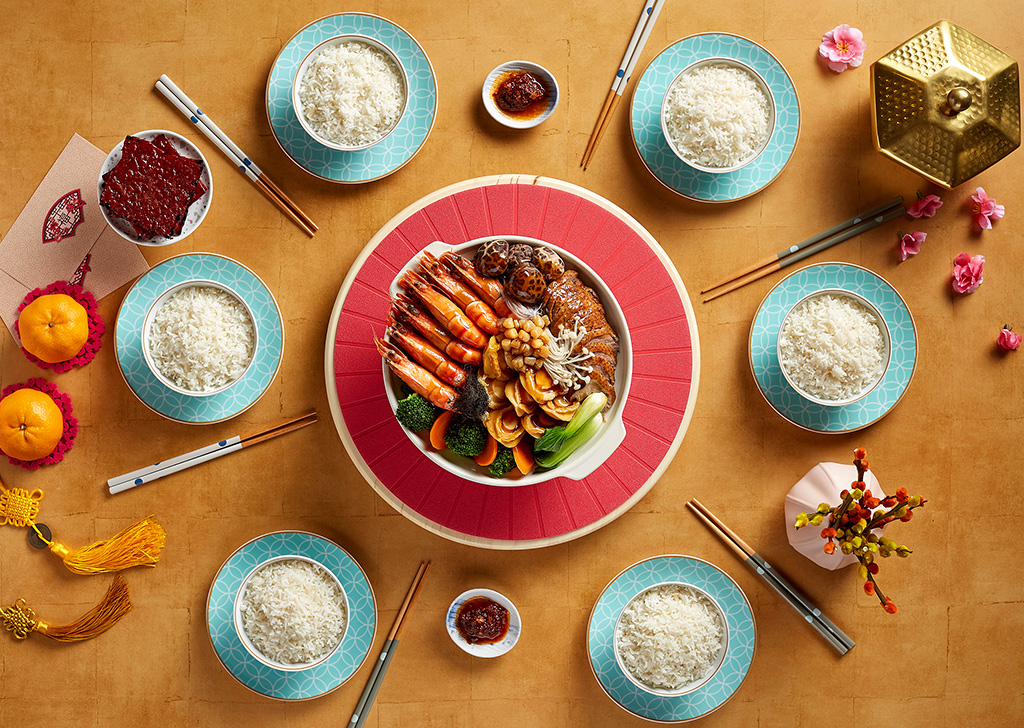With countless flat lay shots taken and uploaded online every day, it can be tough to stand out from the crowd. Today, we’re going to be dissecting three beautiful flat lays taken by our Canon community of food photographers to learn how it’s done and for you to pick up a trick or two!

EOS 5D Mark III, EF50mm f/1.2L USM, f/8, ISO 100, 1/160s, 50mm
By @benetan74
Symmetrical Composition: a simple yet effective technique for a flat lay would be to place your main subject (or dish) right in the middle of the image or frame and create a symmetrical pattern using other elements to frame it. In this image, the dish has been framed by similar looking bowls of rice and chopsticks. This composition is straightforward and clear, allowing viewers to accurately identify the focal point in the shot.
Contrast: there’s a lot of contrast happening in the image. One contrast is the striking white rice and vibrant-coloured dish in the middle. The subtler contrast is in the choice of greens in the main dish against the red plate they sit in. This enhances the effect of the shot as it allows the main elements to pop from the image to grab the viewer’s attention. Learn how to capture colours accurately in your images here!
Neutral Elements: the elements used do not vie for attention. Instead, they are almost the same colour tone as the backdrop and only there for storytelling purposes.

EOS 5D Mark III, EF50mm f/1.2L USM, f/8, ISO 100, 1/160s, 50mm
By @benetan74
Contrast and Framing: using light and dark, this image was shot at the edge of a white table which contrasts against the dark wooden floor and chair. This creates a frame-within-a-frame composition, bringing prominence to the food on the white table. The use of neutral backdrops (both the table and the wooden floor) creates a contrasting effect that works well against the vibrant plate and colour in the food.
Textures: notice how everything else in the image is flat and smooth except for the food? This allows the food to look more dimensional and appetising. Of course, lighting also plays a part in creating the right amount of shadow on the rice.
Off-Centre Placement: although placing the subject in the middle works, having it slightly off-centre brings a dynamic asymmetrical balance to the image as one side becomes heavier than the other. This image now has more emphasis on the bottom, adding more interest.

EOS 70D, EF-S 18-55mm f/3.5-5.6 IS STM, f/8, ISO 320, 1/5s, 29mm
By @nickastig
Human Element: adding human elements in your flat lay shot humanises the image and brings relatability to the viewers. They can also bring some drama through actions within the image too. Here’s an example of adding drama through a cheese pull shot!
Storytelling: the use of elements, such as red berries and leaves, are related to the food and add a moody, rustic and festive storyline to the image. One can quickly interpret this image as Christmas or Thanksgiving-inspired.
Bonus Tips:
- If you’re not the one preparing the food, you won’t have much control over how the colours appear in the main dish. However, you can always play around with elements that you can control, such as props, backdrop and composition. Try choosing props that tell a complementary colour story to the image for a contrasting look or within the same tone for a monochromatic feel.
- Flat lays are not suitable for all food! Some food just looks better when taken from another angle. However, you can still experiment with the food placement if required. For example, you can take a stacked hamburger, cut it in half and face it upwards to showcase the food in a different light.
- Use a tripod with extending arms! This way, you can capture a top-down shot without the need to shoot it handheld. You can also turn your Vari-angle LCD monitor on your camera for comfortable viewing on the screen (mobile phone, tablets or computer when using tethered shooting method). Additionally, it allows more adjustments to precisely adjust the shot while helping with the framing within the image. You can even incorporate your own hands this way as you can use a timer and free up both of your hands!
- Choose a deep depth-of-field if you’re framing the scene within the LCD screen. This way, you can ensure that all the necessary elements are clear!
Here’s why mirrorless cameras allow easier composition for your shots!
For similar articles:
Applying Creative Filters to Artsy Food Photography
How To Create and Photograph Stacked Still-Life Food Structures


































